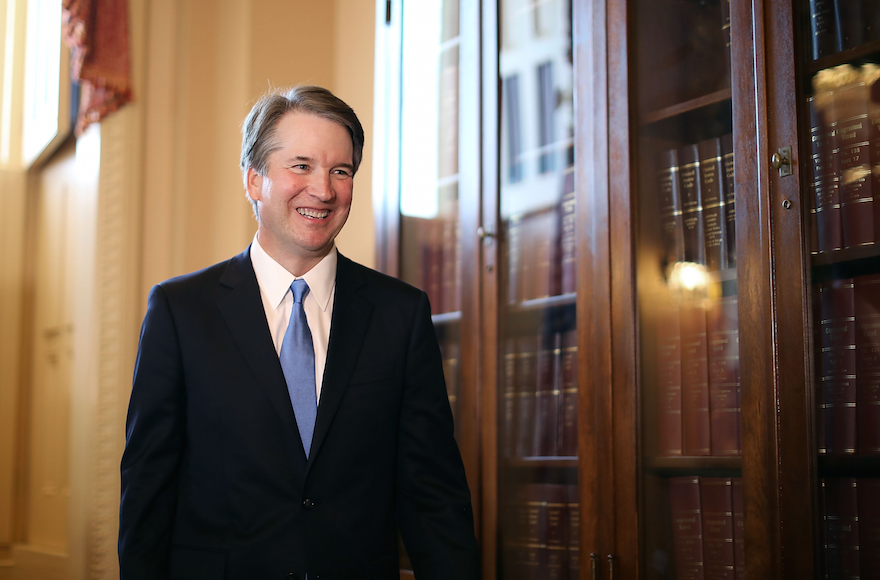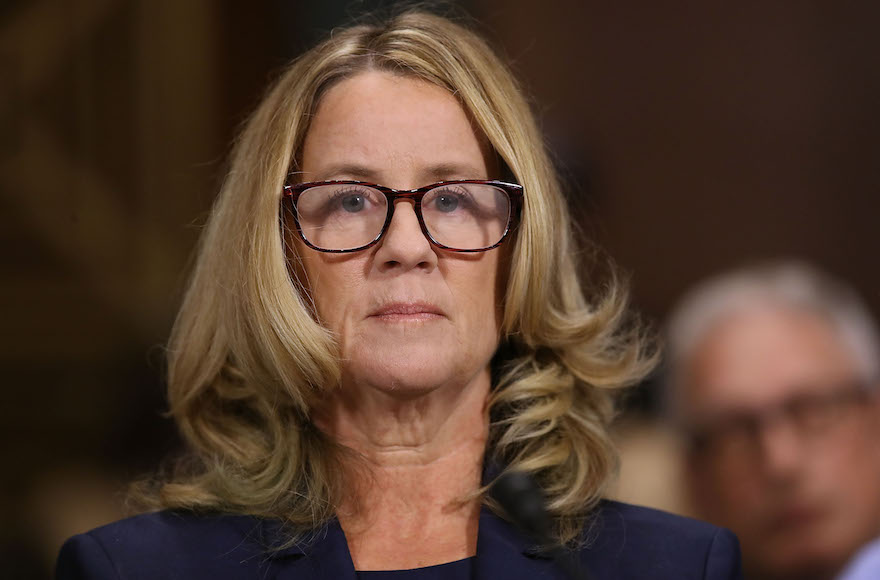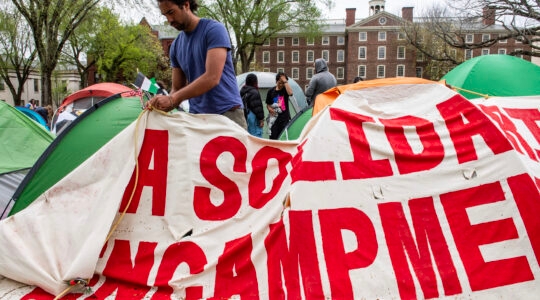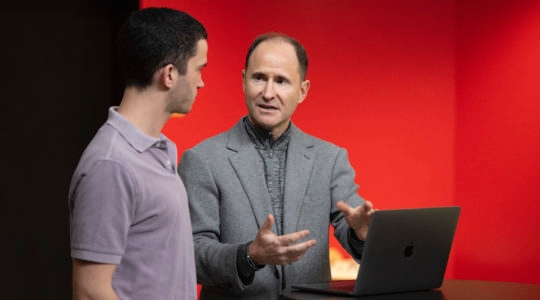NEW YORK (JTA) — As Supreme Court nominee Brett Kavanaugh testifies in front of the Senate Judiciary Committee on Thursday, he will have to answer questions about sexual misconduct allegations leveled against him. In recent weeks, three women have said the judge engaged in inappropriate behavior or assault as a high school or college student.
The allegations have ignited conversations across the political spectrum, from how assault survivors often keep their accusations private out of fear or trauma, to whether people should be held accountable for actions they committed as teenagers, to how the credibility of the allegations is to be assessed.
We asked rabbis how Jewish law and ethics can help us understand the misconduct claims. Here are their answers via email, which have been lightly edited for grammar and style.
The path to repentance
Rabbi Meesh Hammer-Kossoy is an instructor at the Pardes Institute of Jewish Studies, a nondenominational yeshiva in Jerusalem. She has taught about how the Talmud helps us understand the #MeToo movement and the ethics of anonymous allegations.
Jewish tradition gives us several important lenses for understanding the accusations against Judge Kavanaugh. On the one hand, the Talmud tells us, “A priest who kills a person is disqualified from performing the priestly blessing” (Berachot 32b). Some acts — even if they are not prosecutable in court — forever stand in the way of high leadership.
On the other hand, as of today, the accusations against Judge Kavanaugh pertain to incidents in the far past. Is there no chance at all for a person to move on from mistakes? Commenting on the above statement in the Talmud, the Shulchan Aruch preserves a debate about whether repentance restores the killer’s priestly privilege (SA OH 128:35). According to Rabbi Joseph Karo, “a prosecutor cannot turn defense attorney” — spiritual rehabilitation doesn’t privilege a murderous priest to bless the nation. Rabbi Moses Isserles disagrees: Jews forgive.
Maimonides lays out clear steps for repentance including recognizing the sin, confessing it, making amends and changing future behavior. Has Kavanaugh confronted his offenses? Even if he has, will that be sufficient to allow a “prosecutor” — someone who has been responsible for grave violations of human dignity — to become a “defense attorney” entrusted with protecting all people, including women?
Of course, all of this depends on substantive evidence of Judge Kavanaugh’s acts and character. For that, we await the upcoming Senate hearing and investigations that may follow.
Regarding the victim
Rabba Sara Hurwitz is the co-founder and president of the New York-based Yeshivat Maharat, the first institution to ordain Orthodox women as clergy. She has written about women leadership in the era of #MeToo.
The #MeToo movement has compelled society to grapple with many key questions: Do people lie about assault for their own gain? Should we extend statute of limitations? How should we define the parameters of sexual harassment? Do perpetrators deserve redemption? But I believe the most fundamental question we should ask, and of primary concern in our Jewish tradition is: Has the victim suffered?
Indeed, the Gemara’s posture is to protect the victim from physical harm. “One who wounds his neighbor is liable to pay for five damages: permanent impairment, pain and suffering, healing expenses, unemployment, and shame” (Mishna Baba Kama 8:1).
The rabbis understood that there are multiple layers of harm that can be inflicted on another person. In addition to physical pain and suffering, a victim may also suffer from inability to be productive and successful at work. He or she may need “healing expenses” in recognition that there is real work and time to the healing process. The damage caused may be permanent, no matter how far back it occurred. Finally, a victim also experiences shame, emotional distress, beyond visible physical wounds. So, the question that I believe we must all instinctively grapple with first is about the welfare of the victims. Have they suffered? And, have appropriate damages been paid?
Rabbi Pesach Lerner is the president of the Coalition for Jewish Values.
The Torah says: “Lo yakum eid echad b’ish… Al pi shnei eidim oh al pi shloshah eidim yakum davar” — “A single witness shall not stand up against any man… according to two witnesses or according to three witnesses shall a matter be confirmed.” (Deut. 19:15)
A deeply flawed process
Rabbi Hara Person is the chief strategy officer for the Reform movement’s Central Conference of American Rabbis and the publisher of CCAR Press. She has written about how Jewish communities should deal with harassment of female rabbis.
The text of Deuteronomy 16:20 comes to mind: “Justice, justice, shall you pursue.” The repetition of the word “justice” in this verse reminds us how critical the pursuit of justice is to a healthy society. Commenting on this verse, Rashi proposes that it is the appointment of honest judges that allows society to thrive. Ibn Ezra goes even further, suggesting that the duplicated word means that each side in a suit must pursue justice, whether each party will benefit or not, implying that the pursuit of justice is a higher value than partisanship.
In contrast, the Kavanaugh hearings are a deeply flawed process, driven by partisanship and designed to obfuscate rather than illuminate the truth. The minimal amount of documentation on Kavanaugh that has been provided is problematic enough. Added to that the accusations of sexual assault that have arisen that are not being properly investigated, and the rush to bring the hearings to a rapid close, all seem intended to circumvent the path of true justice. That this is being done in order to name someone as a judge to the highest court of the land is a perversion of justice that is destined to bring about chaos and mistrust of the legal system, the opposite of a healthy and thriving society that Judaism posits as an ideal.

Brett Kavanaugh at the U.S. Capitol in Washington, D.C., July 10, 2018. (Chip Somodevilla/Getty Images)
Holding leaders accountable
Rabbi Aviva Richman is a faculty member at Hadar. Her areas of study include Jewish law, gender and sexuality in Judaism.
The Bible makes a distinction between sex crimes in a city and a field. The rabbis interpret the“city” not as a matter of population density but culture. A city is a place where people care about sexual assault and respond. In this context, the rabbis focus on the responsibility of the community and leadership to respond to and ideally prevent sexual violence. Under this rubric, one medieval Talmud scholar characterizes the entire Persian empire under king Ahashverosh (Ahasuerus) as a field. Since the supreme leader of the land was a womanizer, acting like he was sexually entitled to any woman he wanted, no one in his kingdom took sexual violence seriously.
When our national leaders dismiss accounts of sexual assault because “nothing happened,” or refuse to put in place and follow clear protocols to respond to these accounts, they are setting a tone that has ripple effects well beyond the bench of nine justices.
This is a moment where we have to ask ourselves, do we live in a city or a field? We must hold our leadership accountable to take sexual assault seriously. Otherwise, the most robust system of courts and justice is really just an empty field.
How we treat the other
Rabbi Jacob Staub is a professor at the Reconstructionist Rabbinical College in Wyncote, Pennsylvania. He has written about gender dynamics and sexuality in light of #MeToo.
A central teaching of Musar, Jewish ethical literature, is that we are each obligated to treat the other according to his or her needs. It is upon us not to assume that we know what they need. Rather, we must go out of our way to uncover what they lack and serve them according to what they need. By contrast, the behavior described by Judge Kavanaugh’s accusers reflects an orientation that is diametrically opposed to this Jewish principle. Their stories paint a picture of men using women to satisfy their own needs without any concern for the lifelong traumatic impact that treatment may have upon them. May it be the case that one consequence of the Kavanaugh nomination is that all of us will examine how we can treat other people with the respect and care that is the right of those created in the image of God.
Public service is a privilege
Rabbi Mira Wasserman is director of the Center for Jewish Ethics and assistant professor of rabbinic literature at the Reconstructionist Rabbinical College. At RRC, she organizes a project to collect responsa on Jewish ethics and the #MeToo movement.
A story in the Talmud (Moed Katan 17a) anticipates current events: Terrible rumors about a local rabbi reach Rav Yehuda, a leading rabbinic authority in Babylonia. Rav Yehuda deliberates about what to do: On the one hand, the accused rabbi offers valuable services to a local community; on the other, the rabbi’s tarnished reputation degrades his office (in Talmudic language, “profanes the name of God”). In the end, Rav Yehuda decides to act on the allegations and ostracize the accused. On his deathbed, Rav Yehuda expresses satisfaction that he did not bow to pressure to flatter an important man but was rather governed by principle.
These are the principles I draw from the story:
1. For the rabbis, there is a high standard of evidence. In the absence of corroborating testimony, a plethora of allegations — no matter how persuasive — do not suffice to convict the accused of a crime.
2. Public service is a privilege, not a right. Judges, like rabbis, are to be held to the highest ethical standards. Serious allegations — even in the absence of evidence — suffice to exclude the accused from a respected office of leadership.
3. True leadership means applying these principles to everyone, without regard for the status of the accused.
Bias vs. the search for truth
Rabbi Avi Weinstein is the head of Jewish studies at the Hyman Brand Hebrew Academy, a community day school in Overland Park, Kansas. He has written about how Jewish texts address the concept of truth.
The classic rabbinic assumption is not that “we can’t handle the truth”; it’s just that we can’t get to it. The dialectic method so familiar to traditional learners is meant to mitigate personal biases in order to approximate arriving at the “truth.” We aspire to know the truth. Ultimately, realizing it is always elusive. When the esteemed senators arrive with publicly announced foregone conclusions regarding the candidate, this does not augur well for this, the most lofty of aspirations. A judge in Jewish tradition had to be wary of his own biases as well as the limitations of clever argument.
The charges levied against the judge would most certainly be disqualifying, but would the suspicion alone be enough for him to be dismissed? How much smoke does there have to be before we assume that there is a fire? On this, there could be a variety of opinions, but all would agree that acumen alone would not be sufficient for a Jewish judge to be acceptable. It comes down to how one evaluates suspicion without hard evidence, and that brings us back to our biases, which inevitably cloud our aspiration to learn what is true.
JTA has documented Jewish history in real-time for over a century. Keep our journalism strong by joining us in supporting independent, award-winning reporting.






